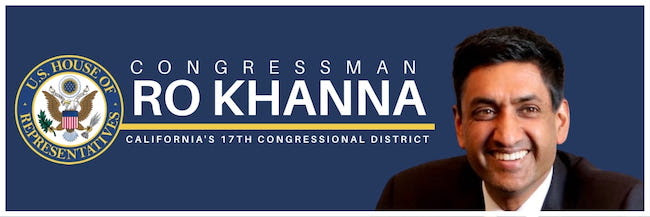
Congressman Ro Khanna’s comments on Silicon Valley Bank
On March 29th, Ding Ding TV hosted Silicon Valley Entrepreneurs Forum at Ding Ding TV studios. The forum’s topic was “How will the collapse of SVB change Silicon Valley?”
Co-organizers and partners on the event included Sandhills Investment Club, Incepvision Law, TSVC, Founders Space, and Silicon Valley Central Chamber of Commerce.
Who is responsible for the SVB collapse? How will it affect startups, venture capital, and the ecosystem of Silicon Valley? If Silicon Valley is no longer the best place, where can investors put their money? What are the consequences or loopholes in the US financial system and policy? Will SVB collapse cause a new financial crisis, or could this cause the butterfly effect? What lessons can be learned from SVB to avoid this from happening in the future?
Read about the event or watch YouTube video.
From Congressman Ro Khanna’s “March Updates from DC and the District” newsletter:
“Responding to Silicon Valley Bank
When news broke of the Silicon Valley Bank collapse, I organized a virtual townhall with over 600 people that lasted for three hours with tech leaders, startup founders, nonprofits and small businesses owners. In these conversations, I emphasized the need for decisive action to protect depositors and workers. The concern was not for the bank executives or investors –– it was for the regular workers and their paychecks. Shortly after the call, I went on Face the Nation right after Secretary Yellen. While I have great respect for her, I pushed back on her remarks and called for more clarity and greater strength.
In the days that followed, I held a roundtable with constituents including Marie Bernard from Sunnyvale Community Services, a nonprofit in my district supporting people experiencing homelessness and hunger. After years of never missing a payment, they were on the verge of paying off the mortgage for a larger facility to serve their clients. They worried they might lose their deposits and therefore their ability to pay their mortgage. They and the other organizations and workers who did nothing wrong deserve to be protected.
I am glad that the Department of Treasury listened and moved to protect workers, the innovation pipeline, and the economy at large. But the work doesn’t end here. We’ve known since 2008 that stronger regulations are needed to prevent exactly this type of crisis. Congress must come together to reverse the deregulation policies that were put in place under Trump to avoid future instability.”
